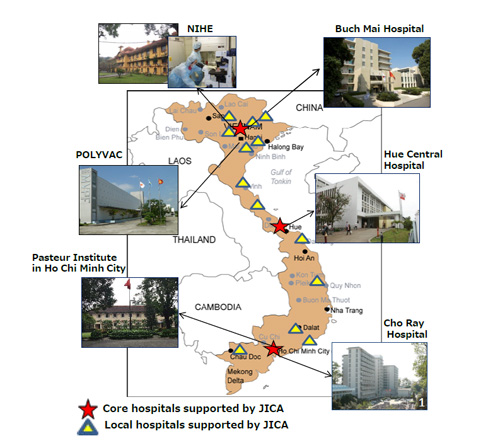- Since the 1970s, JICA has supported to a total of 24 hospitals including core hospitals in three locations, and contributed to the establishment of medical systems and its infrastructure as well as professional human resource development.
- The experience of Bach Mai Hospital during the SARS epidemic in 2003, as well as the 15-year track record in supporting infectious disease research and strengthening of testing systems, have contributed to Vietnam's COVID-19 measures in this pandemic.
Strengthening the medical system
Capacity building extending from base hospitals to local hospitals
Cho Ray Hospital, a base hospital in the southern part of Vietnam, accepted and provided treatment for the first COVID-19 patient in the country. During the second wave that hit the central Vietnam, it provided support for the treatment of severely ill patients by providing medical equipment such as artificial lungs and dispatching medical teams. It is also working to raise medical standards by distributing manuals and conducting training for 25 provinces in the south.
Strengthening the laboratory system
From strengthening core research institutes to building and strengthening laboratory networks
The National Institute of Hygiene and Epidemiology (NIHE) has played a central role in building and expanding a nationwide COVID-19 laboratory network (contributed to the increase in the number of accredited COVID-19 testing agencies from 4 to 86 since February 2020). It is engaged in joint research on COVID-19 antibody testing kits with Nagasaki University, and is collaborating on the formulation of testing guidelines.
Strengthening the prevention system
Strengthening production capacity for domestic vaccines
The Centre for Research and Production of Vaccines and Biologicals (POLYVAC), with support from JICA, is strengthening its production capacity for domestically produced measles vaccines and measles-rubella vaccines. During the measles epidemic of 2014, it supplied quality measles vaccines meeting high safety standards, contributing to efforts to control the epidemic. Currently, POLYVAC is engaged in the development and production of a domestic COVID-19 vaccine by harnessing the measles vaccine production technology it has already established.





scroll